|
|
|
Sort Order |
|
|
|
Items / Page
|
|
|
|
|
|
|
| Srl | Item |
| 1 |
ID:
076844
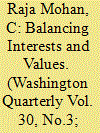

|
|
|
|
|
| Publication |
2007.
|
| Summary/Abstract |
As India celebrates the 60th anniversary of its independence, a paradox stands out. Much of the world sees a profound commitment to democracy amidst bewildering diversity as the defining feature of modern India. Yet, democracy as a political priority has largely been absent from India's foreign policy. New Delhi's conspicuous lack of emphasis on democracy in its engagement with the world is largely a consequence of the Cold War's impact on South Asia and India's nonaligned impulses in the early years of its independence. It attached more weight to solidarity with fellow developing countries and the defense of its own national security interests without a reference to ideology at the operational level.
Since the end of the Cold War, however, supporting democracy abroad as an objective has begun to factor into India's policymaking. This priority has been triggered by intensive engagement with the United States since the early 1990s. In the final days of the Clinton administration and through subsequent terms of the Bush administration, Washington has emphasized the importance of India as the world's largest democracy, underlined the role of shared political values in transforming bilateral relations, and explored options for working with New Delhi on the promotion of democracy worldwide. India has in turn confronted new challenges, such as potential failed states in the region; managing consequences of internal conflicts within its smaller neighbors; and if possible, nudging these countries toward democratic evolution. As an emerging great power in its own right, India has also been increasingly called on to contribute to international peace and security, which in the contemporary world increasingly focuses on conflicts within states.
Among these external impulses, the question of India's political values and their role in the conduct of India's international relations are bound to figure more prominently in the future policy discourse in New Delhi. Yet, the question remains: Will democracy become a more important natural component of future Indian foreign policy as many in the West hope?
|
|
|
|
|
|
|
|
|
|
|
|
|
|
|
|
| 2 |
ID:
141693
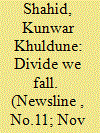

|
|
|
| 3 |
ID:
076846
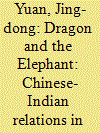

|
|
|
|
|
| Publication |
2007.
|
| Summary/Abstract |
Despite unresolved territorial disputes, mutual suspicions over each other’s military buildup and strategic intent, potential economic competition, and the changing balance of power and realignments, China and India have enjoyed 10 years of mostly uninterrupted progress in their political, economic, and security relationship. President Hu Jintao’s November 2006 visit to India, the first such visit by a Chinese head of state in a decade, marked an important milestone in the bilateral relationship. During Hu’s visit, the two governments issued a joint statement highlighting a 10-point strategy to elevate the relationship and signed more than a dozen agreements to strengthen cooperation in trade, investment, energy, and cultural and educational exchanges.
Hu’s visit to India injected optimism and high expectations for Chinese-Indian relations, but the challenges ahead remain daunting. They include unresolved territorial disputes, mutual suspicions of each other’s intentions, and power realignments at the global and regional levels. The substance and consolidation of the bilateral relationship will depend on how the world’s most populous and fastest-growing states manage these challenges as they continue their ascent to great-power status. Moreover, as the world becomes increasingly affected by the rise of these two Asian powers’ phenomenal economic growth and political influence, how Beijing and New Delhi handle their bilateral relationship will be critical for regional and global peace and prosperity in the coming years
|
|
|
|
|
|
|
|
|
|
|
|
|
|
|
|
| 4 |
ID:
078115
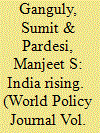

|
|
|
| 5 |
ID:
105686
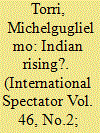

|
|
|
|
|
| Publication |
2011.
|
| Summary/Abstract |
There is no doubt that the Indian economy is one of the fastest growing in the world. However, such growth has been socially unbalanced, benefitting only a minority of the population. This, in turn, has brought about huge and increasingly dangerous social and political problems, such as an epidemic of suicides among farmers and the resurgence of the Maoist 'people's war'. Nevertheless, while Indian growth is limited to a minority of the population, it is real and important. Only the future can tell if, true to some projections, India will become the third or first world economy by 2050. What is certain however is that, because of the rapid economic development of the past three decades, India has already become a key world player.
|
|
|
|
|
|
|
|
|
|
|
|
|
|
|
|
| 6 |
ID:
080478
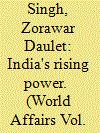

|
|
|
| 7 |
ID:
076845
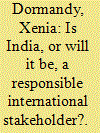

|
|
|
|
|
| Publication |
2007.
|
| Summary/Abstract |
It has become a cliché that the key strategic challenges facing Washington and the wider international community, such as energy, water, terrorism, economic development, and nonproliferation, cannot be solved by the United States alone. Although the United States unarguably retains its post-Cold War preeminent position, events since the September 11 attacks have shown the limitations of Washington's hard and soft power. Meanwhile, the power of Europe and Japan are waning as they face internal distractions that limit their influence, while China's is rising globally and in Asia, arguably the most important region to the United States strategically. China's increasingly high military spending has built strong and capable armed forces, and its economic power is developing swiftly, with annual growth averaging nearly 10 percent over the past 20 years. From a low following Beijing's crackdown on the 1989 Tiananmen Square protests, China's influence is growing as well.
These power fluctuations compel the United States to seek out like-minded allies that will proactively help to resolve global as well as Asian challenges. In September 2005, Deputy Secretary of State Robert Zoellick asked whether China would rise peacefully to become a "responsible stakeholder" that "recognize[s] that the international system sustains their peaceful prosperity, so [that] they work to sustain that system." He went on in the speech to solicit China's cooperation on a number of global issues, including North Korea, nonproliferation, and terrorism. Considering India's significant rise over the past few years, the same question could be asked of India. Largely unnoticed by the global community, India has ascended to the world stage over the past 15 years, building on its economic reforms of the early 1990s and nuclear tests in 1998. In addition to an economic growth rate second only to China's, at 8 percent annually over the past three years, New Delhi continues to retain its position as leader and cofounder of the Non- Aligned Movement (NAM) and unofficial head of the developing world. India has the third-largest army, fourth-largest air force, and seventh-largest navy worldwide and is eagerly lobbying to be considered a global player, actively seeking a permanent seat on the UN Security Council.
Both President George W. Bush and then-Prime Minister Atal Bihari Vajpayee have described the bilateral relationship as that of "natural partners." The United States has made India one of its central foreign policy foci and a powerful success story, especially since President Bill Clinton's triumphal five-day visit in 2000. Considering its capabilities, will, interests, and values, India would seem to make an ideal partner in the region and even globally. Will India live up to the U.S. definition of an "international stakeholder"? What might be the constraints on its desire or ability to do so?
|
|
|
|
|
|
|
|
|
|
|
|
|
|
|
|
| 8 |
ID:
109554
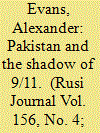

|
|
|
|
|
|
|
|